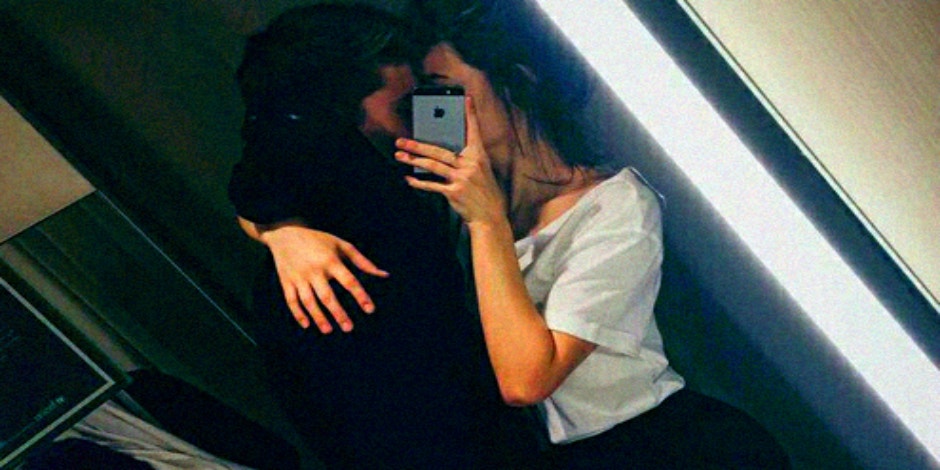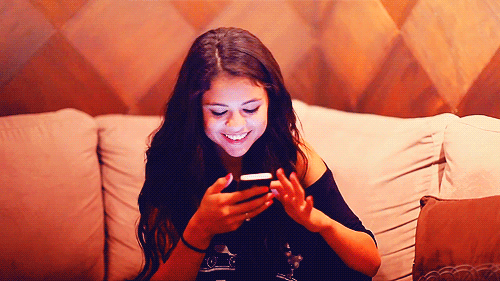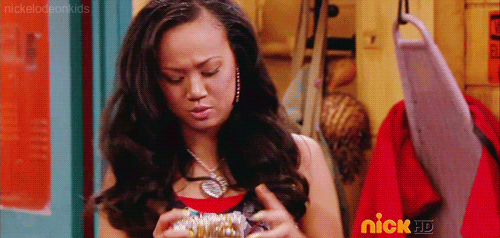STOP With GIFs And Memes! I Miss The Days When Writing Was Enough
Are words just too long, too dull now? Do words take a backseat to pictures, easy-breezy pictures?
 weheartit
weheartit Our love affair with screens started a long time ago. While we loved our televisions from the beginning, we really loved them when we saw them in the windows of stores, on sale, by the hundreds. All of those glistening, colorful, shiny screens, all shapes and sizes. Oh, how they would capture our attention and oh, how we would stare. It didn't really matter what we were watching; we simply couldn't look away.
And then came the sports bars: those restaurants that were, at one point, neighborhood pubs that aimed to please locals by means of providing pub grub, good beer, darts and cheery mates. Up went the televisions on their ingenious, hovering mounts and before we knew it, bar talk now had a mutual focus: whatever game was on. It was a turning point for us; we now all had something in common: the television.
As time progressed, we'd see TVs pop up in regular restaurants as well. One person could glom down their sushi while the other stared over the sushi eaters' shoulder, unable to tear their eyes from the screen. In truth, it is impossible to not look at a screen when there is one in the room... and everyone knew it.
Smartphones took it all to the next level, and here we are today: obsessed and incapable of living without bright screens in front of our faces, 24/7. Complain or accept, it doesn't matter. It's on and there's no going backward.

Tenor
But for the sake of our history as human beings, what actually did we leave behind? What did our love affair with screens take from us — and do we even care?
We live our lives on phones and on computers. The internet is the brave new world where language itself is changing. Our love of speed has inspired us to create quicker ways of communicating with each other. We've become intolerant of lengthy sentences; in fact, we aren't fond of words at all anymore. We text our friends acronyms to save time and we expect them to do the same in turn. We respond with GIFs and graphic memes to express our reactions to questions.
It's no longer interesting to express one's self in words, and certainly, if we are to indulge in such frivolity, please, for the love of the internet, let that expression be brief. Don't bore us to the chorus, as they used to say in the songwriting field. Give us the meat and potatoes up front; don't bother with the preamble — we simply don't care.
What human emotion cannot be represented by an emoticon, after all? And what specific detail cannot be best said in a meme, created by some random stranger, which shows its stamina and endurance by being reblogged thousands of times? Yes, those very memes cover the whole of everything we'd ever want anyone to know of us.
I do realize that not everyone is a poet, nor is everyone a speaker of the same language and that emoticons and memes serve a purpose: to bridge the gap between what we truly feel and what we are capable of expressing. Nothing wrong with a smiley face when we wish someone to think we are smiling.
What I fear is the ease. If our written language is not good enough for the internet, then what is it good for? If we are advancing to a place where we speak to each other in pictures, rather than words, will we eventually forget the beauty of words? Or are we already that advanced?

Gurl
If we want to participate in a conversation on the internet, we simply have to keep a folder of memes, collected from other people's responses, and when the time is right we open that folder and drop in the suitable meme. The only real stimulation we give ourselves is the intellectual choice of choosing the "right" meme to stun the masses with.
Remember how we all used to associate the wordy newspapers as the snooty, intellectual ones, while we thought of the papers that printed many photos as the stuff for the common folk? It was like the New York Times versus the New York Daily News. Both had their place in our hearts.
One, lofty and unreachable, and the other, down to earth and a bit cheap. Something for everyone. But the New York Daily News still made use of those rarely respected things called words. What communication on social media has become is the Daily News without words.
There used to be a joke about jokes. After a certain number of times of hearing the same joke, as good as it was, it was known as #35 or #42. As if we have this stock of jokes, all numbered, and rather than tell the joke again, we'd just shout out, "#35!" and the crowd would go crazy.
That's what it feels like to me when I ask a question on the internet and someone answers me with a meme, rather than words spoken from their heart. It's as if they just shout out a number we all know, and from there we act appropriately. Ring the bell, salivate on cue.
A question such as, "What do you think of the current state of affairs?" can now merit an answer like, "Meme #17!" If I ask a person what they think, it's more than likely that I'm asking them what THEY think, not what someone else thought and made into a Photoshop graphic to convey their message.
And while I understand not everyone wants to speak their mind, nor does everyone want to be serious or take things seriously, I miss the days when words were enough. I would like to see people put themselves to the test and try. Like the words from that ancient REM song: "I think I thought I saw you try."
Are we past trying? Are words just too long, too dull now? Do words take a backseat to pictures, easy-breezy pictures?
Do those who use the English language know how gorgeous their language is, how capable? Are we embarking on a journey that requires we forget nuance and poetry in order to consider ourselves progressive beings?
So many of us no longer read books. We've replaced books with tiny bright screens, filled with memes and emoticons. Stories are tolerated only in film; words are those things that come in handy only when speaking. But to write them, to write them beautifully, to write them with passion and to back up those words with real human emotion? Does this even exist anymore?
Is the meme really mightier than the sword? Perhaps it is. And what should we do if, suddenly, a massive hack throws us all offline and into a world where we have to seek the entertainment of words? Do we perish? Or do we rise?
No, we are not all writers, but we are all human beings and we all have a story to tell. That story comes out in bits and pieces, and if told with any honesty or finesse, we can affect people. We have to remember that we are not idiots.
We are not idiots.

